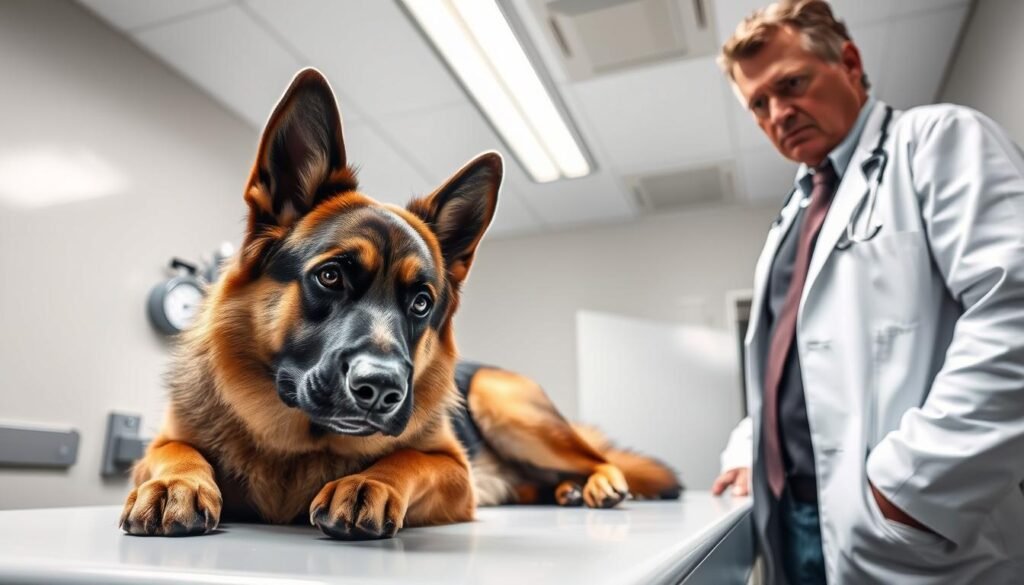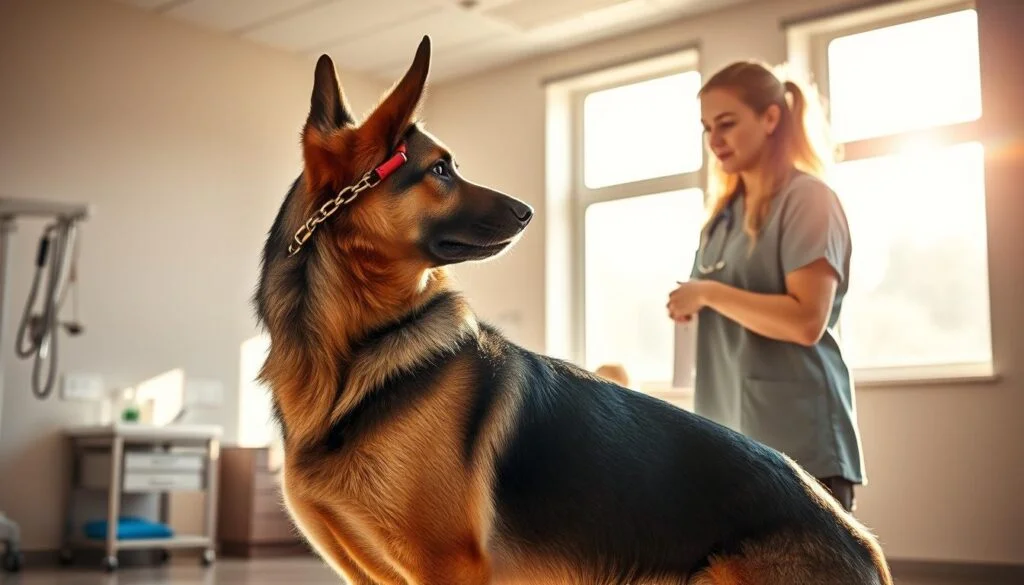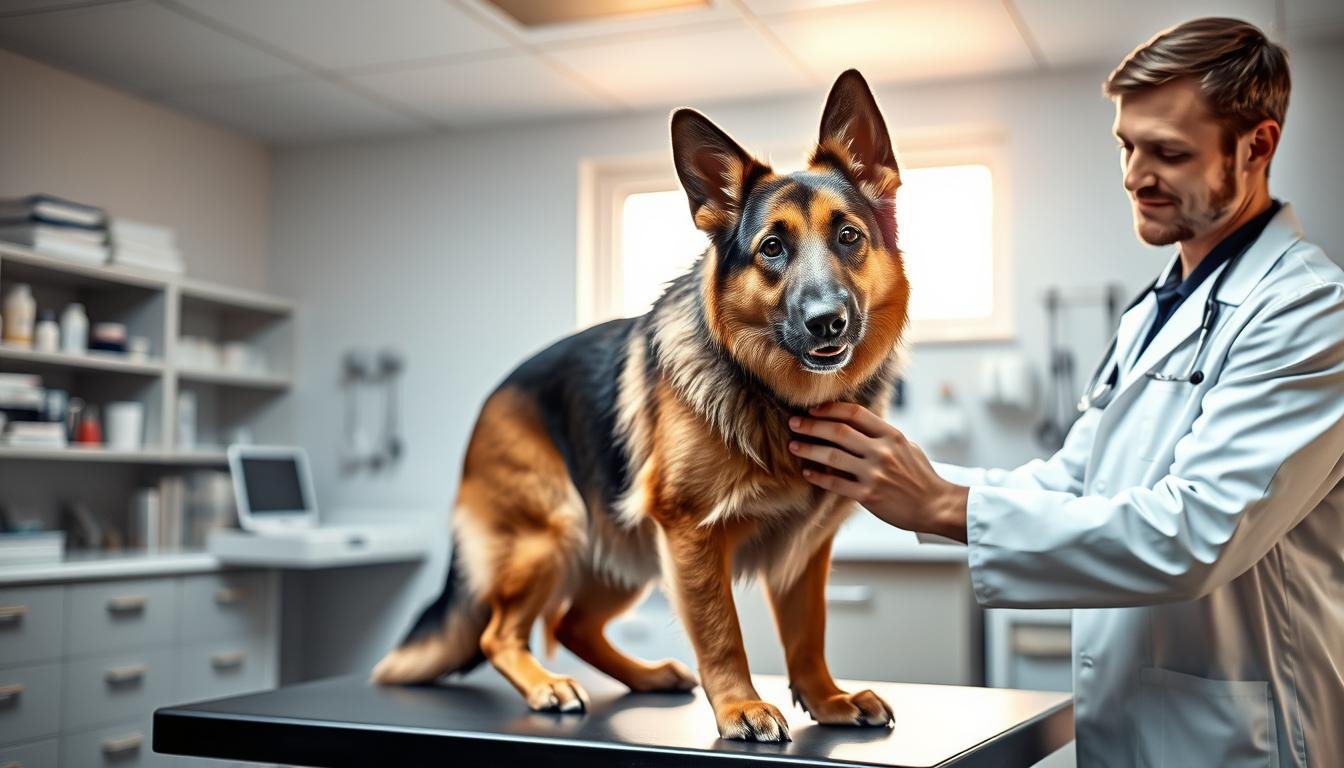The Best and Worst Experiences at the Vet for German Shepherds
Are you prepared for the mix of emotions your German Shepherd might display during a vet visit? As a loyal companion, your dog’s temperament and behavior can significantly influence their experience.
Understanding what makes a vet visit positive or negative is crucial for their long-term health. By exploring the best and worst experiences, you’ll be better equipped to prepare your dog for future visits and minimize stress and anxiety.
Key Takeaways
- Discover how your German Shepherd’s breed-specific traits impact their vet experience.
- Learn practical strategies to reduce stress and anxiety during vet visits.
- Understand the importance of your role in advocating for your dog’s health needs.
- Explore real-life experiences from German Shepherd owners to inform your approach.
- Gain insights into managing your dog’s behavior during examinations.
Understanding German Shepherds and Their Vet Anxiety
The temperament of German Shepherds plays a crucial role in their anxiety levels during veterinary visits. German Shepherds are known for their intelligence, loyalty, and protective nature. These characteristics, while making them excellent companions and working dogs, can also contribute to their stress and anxiety in certain situations, such as vet visits.
The Unique Temperament of German Shepherds
German Shepherds are not naturally aggressive; however, their large size and protective instincts can make them intimidating. Their behavior is significantly influenced by their training and socialization. An untrained German Shepherd can become aggressive due to its protective nature. This breed’s sensitivity to their owner’s emotions means that if you’re anxious about the vet visit, your dog is likely to pick up on those cues and become anxious as well.
The protective instinct is a natural part of German Shepherd behavior, making them loyal and watchful companions. However, this trait can also make vet visits challenging, as the unfamiliar environment and handling by strangers can trigger their protective instincts.
Why Vet Visits Can Be Particularly Stressful for This Breed
Vet visits can be stressful for many dogs, but German Shepherds may experience heightened anxiety due to their breed-specific traits. The combination of unfamiliar smells, sounds, and people at veterinary clinics can trigger a German Shepherd’s protective instincts more intensely than in other breeds.
- The confined spaces of examination rooms can make GSDs feel trapped, increasing their stress levels.
- Many German Shepherds experience separation anxiety when taken to back rooms for procedures without their owners.
- The handling required during examinations often conflicts with this breed’s natural boundaries and personal space preferences.
By understanding these factors, you can take steps to minimize your German Shepherd’s stress during vet visits. Recognizing the sources of their anxiety is the first step towards creating a more positive experience for your dog.
Common Health Issues That Bring German Shepherds to the Vet
As a breed, German Shepherds are susceptible to specific health problems that require careful veterinary attention. You, as a German Shepherd owner, should be aware of these common issues to ensure your dog receives the best possible care.
Hip and Joint Problems
German Shepherds are prone to hip and joint problems, including hip dysplasia, a genetic condition that affects the hip joint, causing arthritis and mobility issues. “Certain ‘pet’ line breeders had been using dogs with hip scores in the 90’s (should be 20 & under),” which highlights the importance of responsible breeding practices. You should work with your vet to monitor your dog’s joint health and develop a plan to prevent or manage these issues.
Digestive Sensitivities
Digestive sensitivities are another common health issue in German Shepherds. Your dog’s diet plays a crucial role in maintaining their overall health. Food allergies or sensitivities can cause digestive problems, such as diarrhea or vomiting. You should consult with your vet to determine the best diet for your German Shepherd and monitor their food intake to prevent adverse reactions.
Skin and Coat Conditions
Skin and coat conditions are prevalent in German Shepherds, often caused by allergies, parasites, or other factors. Their thick double coats can hide developing skin conditions until they become severe, making regular veterinary check-ups essential. Allergic dermatitis, hot spots, and parasitic skin conditions like demodectic mange are common issues that require veterinary attention. You should work with your vet to identify the underlying cause of your dog’s skin issues and develop a treatment plan to address them.
By being aware of these common health issues, you can take proactive steps to ensure your German Shepherd receives the care they need to thrive. Regular veterinary visits, a balanced diet, and proper care can help prevent or manage these conditions, ensuring your dog leads a healthy and happy life.
The Best Experiences at the Vet for German Shepherds
For German Shepherd owners, a positive experience at the vet can be a game-changer, setting the tone for a lifetime of stress-free medical care. Your German Shepherd’s health is paramount, and finding a vet who understands their unique needs is crucial.
Positive First Visits That Set the Foundation
A positive first visit is essential for your German Shepherd’s future vet experiences. Many owners report that a gentle, gradual approach by the vet helps their dogs feel more comfortable. Vets who take the time to build trust before any procedures can make a significant difference. For instance, allowing your dog to become familiar with the exam room and staff at their own pace can help reduce anxiety.
Vets Who Understand the Breed’s Protective Nature
German Shepherds are known for their protective nature, and vets who understand this trait can provide a more positive experience. By adapting their approach to your dog’s individual needs, vets can minimize stress and make the visit more enjoyable. Some vets even schedule German Shepherds during quieter periods to reduce exposure to other animals and minimize protective reactions.
Successful Treatment Stories from German Shepherd Owners
Many German Shepherd owners have shared success stories about their vet experiences. For example, vets who involve the whole family in the dog’s care can help reduce stress and make the experience more positive. Additionally, vets who prescribe appropriate pre-visit anti-anxiety medications when needed can help ensure a smooth visit. By finding a vet who understands your German Shepherd’s needs, you can transform their healthcare experience and improve your overall quality of life.
The Worst Experiences at the Vet for German Shepherds
The vet visit experience can be especially stressful for German Shepherds due to their size, intelligence, and protective instincts. While many vet visits are necessary for maintaining their health, some experiences can leave a lasting negative impact.
Traumatic Restraint Situations
German Shepherds are large, powerful dogs, and restraining them during vet visits can sometimes lead to traumatic experiences for both the dog and the owner. Improper restraint techniques can cause physical harm and emotional distress. It’s crucial for veterinarians to understand the importance of gentle, yet firm handling to minimize stress.
Misunderstandings About Breed Behavior
There’s a common misconception that German Shepherds are naturally aggressive. However, their protective nature is often misinterpreted. “They are not inherently aggressive but can become so if not properly trained and socialized,” says a renowned dog behaviorist. Understanding this nuance is key to a positive vet experience.

Recovery Complications After Procedures
German Shepherds are prone to certain health issues, and post-operative care can be challenging. Their high pain tolerance may mask discomfort, leading to potential recovery complications if not monitored closely. Owners should be educated on subtle signs of distress to ensure a smooth recovery. Common issues include digestive sensitivities due to anesthesia and pain medications, and the challenge of administering medication due to their intelligence and potential avoidance behaviors.
As one owner noted,
“My German Shepherd’s recovery was complicated by his refusal to take medication. We had to get creative with treats and administration methods.”
This highlights the need for tailored post-operative care plans that consider the breed’s specific characteristics.
Pre-Visit Preparation: Setting Your German Shepherd Up for Success
By taking proactive steps, you can help minimize your German Shepherd’s stress during vet visits. Effective preparation involves several strategies that can make a significant difference in your dog’s comfort level.
Creating Positive Associations with Car Rides
Many German Shepherds experience anxiety during car rides, which can be associated with vet visits. To counter this, try making car rides a positive experience by offering treats and praise during short trips. Play calming music or audiobooks designed for canine relaxation to create a soothing atmosphere.
Exercise and Mental Stimulation Before Appointments
Ensuring your German Shepherd is well-exercised and mentally stimulated before a vet visit can help reduce their anxiety. Engage your dog in a fun activity or a long walk to tire them out. This can help your dog be more relaxed during the visit, making the experience less stressful for both you and your dog.
Calming Techniques and Products Worth Trying
Several calming techniques and products can help alleviate your German Shepherd’s anxiety during vet visits. Some options include:
- Thundershirts or anxiety wraps that provide gentle, constant pressure.
- Natural supplements containing L-theanine, GABA, or tryptophan, given according to veterinary recommendations.
- Prescription anti-anxiety medications from your veterinarian for severe cases.
- Calming pheromone products like Adaptil collars or sprays.
- Specific pressure point massage techniques designed for dogs.
- Calming caps or head wraps that partially block visual stimulation.
These options can help reduce your dog’s stress and make vet visits more manageable.

During the Visit: Managing Your German Shepherd’s Behavior
The key to a successful vet visit for your German Shepherd lies in understanding and managing their behavior effectively. A well-managed visit not only ensures your dog’s comfort but also helps in making the experience less traumatic for both you and your pet.
Reading Your Dog’s Stress Signals
It’s essential to recognize the stress signals your German Shepherd exhibits during a vet visit. These can include panting, pacing, or avoidance behaviors. Being aware of these signs allows you to intervene early, potentially preventing a negative experience. By understanding your dog’s body language, you can better manage their stress levels.
Proper Handling Techniques in the Exam Room
Proper handling techniques are vital in the exam room to minimize your German Shepherd’s stress. Veterinarians and their staff should be gentle and move at a pace comfortable for your dog. You can also play a role by staying calm and providing reassurance. Discussing handling techniques with your veterinarian beforehand can help tailor the experience to your dog’s needs.
When and How to Advocate for Your Dog
Advocating for your German Shepherd during a vet visit is crucial. If you notice your dog is becoming stressed or uncomfortable, it’s essential to speak up. Requesting breaks, discussing sedation options for stressful procedures, and asking for explanations of procedures before they begin are all ways to advocate for your dog. Your proactive approach can significantly improve your dog’s experience.
Some strategies to consider during the visit include requesting the same veterinarian for each visit to build familiarity and trust, advocating for fear-free handling techniques, and discussing alternative approaches if standard protocols cause significant stress. Being willing to reschedule non-emergency appointments on particularly anxious days can also prevent negative associations with veterinary care.
Training Strategies to Improve The Best and Worst Experiences at the Vet for German Shepherds
German Shepherds can greatly benefit from specific training strategies to improve their vet visit experiences. Training a German Shepherd can reduce behavioral problems commonly associated with this breed. By incorporating targeted training strategies, you can improve your German Shepherd’s behavior at the vet, making the experience less stressful for both you and your dog.

Desensitization Exercises for Medical Handling
Desensitization exercises are crucial for helping your German Shepherd become comfortable with medical handling. This includes getting them accustomed to having their ears, eyes, and paws examined. By gradually introducing these procedures in a controlled and gentle manner, you can reduce your dog’s stress and anxiety during vet visits.
- Start with gentle touch and gradually increase the intensity.
- Reward your dog for remaining calm during the process.
- Practice these exercises regularly to reinforce positive behavior.
Muzzle Training for Safety and Comfort
Muzzle training is an essential aspect of preparing your German Shepherd for vet visits. By teaching your dog to wear a muzzle comfortably, you can ensure their safety and the safety of others during medical procedures. Muzzle training should be done gradually, using positive reinforcement techniques to associate the muzzle with positive experiences.
Building Trust Through Cooperative Care
Cooperative care training teaches your German Shepherd to actively participate in their healthcare, making vet visits less stressful. Techniques such as the “start button” behavior, “chin rest,” “side lie,” and “paws up” positions can be incredibly beneficial. These methods not only reduce anxiety but also make medical examinations more efficient.
Key benefits of cooperative care training include:
- Increased trust between you and your dog.
- Reduced stress during medical procedures.
- Improved efficiency during vet examinations.
By implementing these training strategies, you can significantly improve your German Shepherd’s experience at the vet, making it a more positive and less stressful encounter for both you and your dog.
Finding the Right Veterinary Practice for Your German Shepherd
A great vet can make all the difference in your German Shepherd’s life. When it comes to the health and well-being of your dog, you want a veterinarian who understands the specific needs of your breed.
What to Look for in a German Shepherd-Friendly Vet
When searching for a vet, consider their experience with large, intelligent breeds like your German Shepherd. A vet familiar with the breed’s unique characteristics and health concerns can provide better care. Look for a practice that emphasizes a stress-free environment, as this will improve your dog’s experience.
Questions to Ask Before Booking Your First Appointment
Before choosing a vet, ask the right questions. Inquire if they have experience with working breeds like German Shepherds. You might ask: “Does your practice have experience with working breeds like German Shepherds?” or “How does your staff handle large, protective breeds?” Other important questions include: “Can I remain with my dog throughout procedures?” and “What’s your approach to anxious dogs?”
By asking these questions, you’ll get a sense of whether the vet is a good fit for your dog’s needs. A vet who is open to modified examination approaches and offers pre-visit pharmaceuticals for anxious dogs can make a big difference in your dog’s experience.
Special Considerations for Different Life Stages
Understanding the unique needs of your German Shepherd at different life stages is crucial for a positive vet visit experience. As your dog matures, their requirements during vet visits will evolve, necessitating adjustments in care and handling.
Puppy Vet Visits: Building a Foundation
Puppy vet visits are critical for establishing a foundation of trust and setting the tone for future interactions. It’s essential to make these early experiences as positive as possible. You can achieve this by ensuring the environment is welcoming and your puppy is handled gently and carefully. Positive reinforcement with treats and praise can also help create a favorable association with vet visits.
Adult German Shepherds: Maintaining Health and Trust
For adult German Shepherds, maintaining health and trust during vet visits involves continuing the positive reinforcement strategies initiated during puppyhood. Regular check-ups help in early detection of potential health issues, and being aware of your dog’s stress signals can make a significant difference. Ensuring that your vet understands the specific needs and temperament of your Shepherd is vital.
Senior Care: Making Late-Life Vet Visits Comfortable
Senior German Shepherds require special care during vet visits due to potential sensory changes and reduced mobility. Requesting quiet examination rooms and providing non-slip surfaces can help minimize stress and accommodate their physical limitations. Discussing care and quality of life openly with your veterinarian ensures that your senior dog receives the most appropriate and comfortable care.
When to Consider Specialized Care Options
Addressing severe veterinary anxiety in German Shepherds sometimes demands a more tailored approach than traditional vet care. If your German Shepherd exhibits extreme stress or anxiety during vet visits, it may be time to explore specialized care options.
Fear-Free Certified Practices
Fear-Free Certified practices are designed to minimize stress and anxiety during vet visits. These practices are led by veterinarians who have undergone specialized training to create a more comfortable experience for pets. For German Shepherds, this can mean a significant reduction in anxiety-related behavior problems.
Mobile Veterinary Services for Extreme Cases
In extreme cases where a German Shepherd’s anxiety is too severe to manage in a traditional clinic setting, mobile veterinary services can provide an invaluable option. These services bring the vet to your home, eliminating the stress of travel and the unfamiliar environment of a clinic.
Veterinary Behaviorists for Ongoing Issues
For ongoing issues related to vet visit anxiety, consulting a veterinary behaviorist can be highly beneficial. These specialists have advanced training in both veterinary medicine and animal behavior, making them uniquely qualified to address complex anxiety issues in German Shepherds. They can develop comprehensive treatment plans that include behavior modification, environmental management, and appropriate medications when necessary.
- Veterinary behaviorists understand the neurological and physiological aspects of fear and anxiety, allowing for more targeted interventions for your German Shepherd.
- Consultations typically include detailed history-taking and observation of your German Shepherd’s behavior patterns to identify specific triggers and responses.
- These specialists can coordinate with your primary veterinarian to develop protocols for future veterinary visits that accommodate your German Shepherd’s specific needs.
Conclusion: Creating a Lifetime of Positive Veterinary Experiences
By understanding your German Shepherd’s unique needs and working with the right veterinary care team, you can create a lifetime of positive veterinary experiences. This journey requirespatience, preparation, and a commitment to your dog’s health and well-being.
Creating positive veterinary experiences for your German Shepherd involves understanding their temperament and needs while advocating for their comfort. Consistency in your approach to veterinary visits establishes reliable patterns that build confidence and reduce anxiety in your dog. The investment in propertraining and preparationpays dividends in your German Shepherd’s long-term health outcomes and quality of life.
As you navigate the world of veterinary care, remember that each positive experience builds upon previous ones, gradually transforming even the most anxious German Shepherd into a more confident patient over time. By building a collaborative relationship with your veterinary team, you create a support system that evolves with your dog’s changing needs throughout their lifetime.
With the right veterinary partnership, you can ensure your German Shepherd receives the lifetime of healthcare they need while minimizing stress and building positive associations. Your commitment to understanding and addressing your German Shepherd’s specific needs reflects the deep partnership that makes this breed such a beloved family companion around the world.

